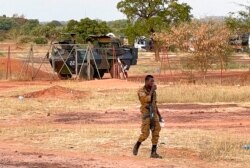A French military spokesperson has denied an accusation that French soldiers shot into a crowd of protesters in Niger late last month. The deteriorating security situation in Africa's Sahel region has been accompanied by protests against the French forces sent to help African governments battle the Islamist militant groups who are increasingly active in the region.
Demonstrations against the French are driven by misinformation spread online that French forces are arming groups linked to Islamic State and al-Qaida — the same groups the French were deployed to fight in the Sahel nearly a decade ago.
On November 26, a French military convoy, which was stranded in Burkina Faso for more than a week as protesters blocked its progress, passed into Niger. The next day, as had happened in Burkina Faso, Nigerien protesters blocked the convoy, demanding to know what was being transported.
Nigerien authorities say two protesters were killed and 16 injured on November 27, while eyewitnesses told the French TV station TV5 Monde that they saw French soldiers firing into the crowd.
In an interview with VOA, Colonel Pascal Ianni, the spokesman for the French Army Chief of Staff, was asked if the French troops had fired on protesters.
"I repeat what I just said, the French forces did not shoot at the crowd," he said. "French forces fired above the crowd and fired in front of the crowd, at the feet of the crowd, to stop the most violent demonstrators."
Ianni said that the French troops and Nigerien military police needed to take action against the protesters, armed with stones and battens, to prevent the convoy being burned and looted.
Regarding the deaths and injuries reported by the Nigerien authorities, he said, "I cannot confirm or affirm the results which were announced by the Nigerien authorities."
Asked if there would be an investigation, since it was unclear what had happened, the colonel said that would be up to authorities in Niger.
"I think they will collect testimonies; they will recover all the videotapes or photos that were taken on this occasion, and they will try to determine exactly who is responsible," Ianni said.
Philippe M. Frowd, associate professor at Ottawa University and an expert on the Sahel, said anti-French sentiment has been growing in the Sahel for years.
"So, many of these fault lines and much of this sentiment, very sort of generic anti-French sentiment, has found a much clearer expression when it comes to blocking this convoy," he said.
Frowd also pointed out that the Nigerien president said last month that French military support is essential to state security.
"The French presence is indispensable and if the French were to leave their base in Gao, in Mali, there would be chaos, so I think that this reflects some sense of the calculus of the Sahel states, looking at French intervention as something that's actually primordial in terms of assuring the security of the state," Frowd said.
Asked if the next French military supply convoy headed for Niger and Mali via Burkina Faso would take a different route, Ianni said officials were "studying different options."





